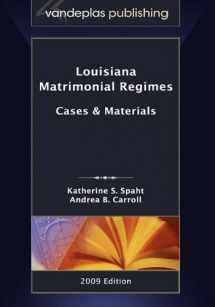
Louisiana Matrimonial Regimes: Cases & Materials, 2009 edition
Book details
Summary
Description
Louisiana Matrimonial Regimes is designed to explore the features of the community property regime, often lauded as one of the most beautiful and significant achievements of the civil law tradition. The community property regime is widely accepted as the marital property regime of choice for an astonishing number of countries, including France, Germany, Spain, Brazil, and countless others. Even on American soil, where the common law tradition has generally been favored over that of the civil law, the community regime has gained significant sway. Nine of our states have rejected the English-inspired marital property regime in favor of the community. This book invites the reader to study the details of Louisiana's regime of patrimonial rights and duties between husband and wife, and also to consider comparisons with the matrimonial regimes of other civilian and Anglo-American systems. About the authors: Katherine Shaw Spaht is the Jules F. and Frances L. Landry Professor of Law (Emeritus) and former Vice Chancellor (1990-1992) at Louisiana State University's Paul M. Hebert Law Center. Since 1972, she has taught courses in the areas of family law and marital property law. In addition to overseeing the revision of Louisiana's community property law in 1978 and drafting Louisiana's covenant marriage legislation in 1997, she has worked with the Louisiana legislature on such varied topics as needs of women, rights of illegitimate children, "assisted conception", child support, no-fault divorce, and same-sex marriage. She has been the Reporter of the Louisiana State Law Institute's "Persons & Family Law" Committee since 1981 and also serves on the American Law Institute's Committee on the Principles of the Law of Family Dissolution. Through the years she has produced a significant corpus of publications pertaining to family and marital property law, including a treatise on Louisiana marital property law (co-authored with Lee Hargrave), which forms part of the Louisiana Civil Law Treatise Series, and most recently, Who's Your Momma, Who Are Your Daddies? Louisiana's New Law of Filiation, 67 LA. L. REV. 307 (2007). Andrea Beauchamp Carroll is the C.E. Laborde, Jr. Professor of Law at Louisiana State University's Paul M. Hebert Law Center. Before joining the LSU Law Center faculty in 2003, Professor Carroll earned a B.S. in Finance from LSU, where she graduated magna cum laude, and a J.D. from the LSU Law Center, where she was a member of the Louisiana Law Review and the Order of the Coif. After earning her law degree, Professor Carroll worked as an associate in the Appellate Section at the law firm of Baker Botts in Dallas, Texas, and clerked for The Honorable W. Eugene Davis of the United States Court of Appeals for the Fifth Circuit. Professor Carroll teaches and writes about the civil law, both in the context of substantive areas such as property and community property, and in the broader context of its interaction with common law systems. She has published a number of scholarly works on family law and community property, including, most recently, Incentivizing Divorce, 20 CARDOZO L. REV. 1925 (2009) and The Superior Position of the Creditor in the Community Property Regime: Has the Community Become a Mere Creditor Collection Device?, 47 SANTA CLARA L. REV. 1 (2007). Professor Carroll also led Louisiana's 2009 legislative reform on reimbursement in the community property context.


We would LOVE it if you could help us and other readers by reviewing the book
Book review



